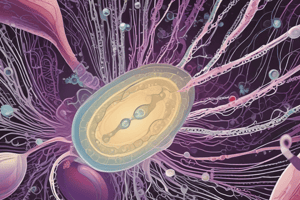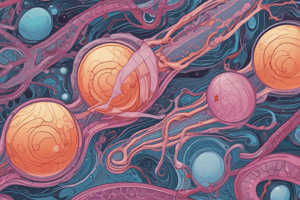Podcast
Questions and Answers
What is the main purpose of spermiogenesis in the process of spermatogenesis?
What is the main purpose of spermiogenesis in the process of spermatogenesis?
- To produce primary spermatocytes
- To produce secondary spermatocytes
- To produce functional spermatozoa (correct)
- To produce haploid spermatids
What is the main purpose of spermatogenesis?
What is the main purpose of spermatogenesis?
- To produce mature eggs in female ovaries
- To produce mature sperm cells in male testes (correct)
- To produce hormones necessary for sexual development
- To produce red blood cells for oxygen transport
What is the result of meiosis II in the process of spermatogenesis?
What is the result of meiosis II in the process of spermatogenesis?
- Two primary spermatocytes with 23 chromosomes each
- Two secondary spermatocytes with 23 chromosomes each
- Two haploid spermatids from each secondary spermatocyte (correct)
- Two diploid spermatids from each secondary spermatocyte
Which stage of spermatogenesis involves the formation of secondary spermatocytes?
Which stage of spermatogenesis involves the formation of secondary spermatocytes?
Where do mature sperm cells move to for further maturation and storage in the male reproductive system?
Where do mature sperm cells move to for further maturation and storage in the male reproductive system?
What is the function of the acrosome and flagellum in spermiogenesis?
What is the function of the acrosome and flagellum in spermiogenesis?
Flashcards
Spermiogenesis
Spermiogenesis
The final stage of spermatogenesis where spermatids transform into mature sperm cells.
Spermatogenesis
Spermatogenesis
The process of producing mature sperm cells in the testes.
Meiosis II in spermatogenesis
Meiosis II in spermatogenesis
The process of cell division that results in two haploid spermatids from each secondary spermatocyte.
Meiosis I in spermatogenesis
Meiosis I in spermatogenesis
Signup and view all the flashcards
Epididymis
Epididymis
Signup and view all the flashcards
Function of the acrosome and flagellum in spermiogenesis
Function of the acrosome and flagellum in spermiogenesis
Signup and view all the flashcards
Study Notes
- Spermatogenesis is the process of sperm cell production in male testes.
- It involves mitotic and meiotic cell divisions, differentiation, and maturation processes.
- The process can be divided into three main stages: spermatocytogenesis, meiosis, and spermiogenesis.
- Spermatocytogenesis involves the division of spermatogonia into primary spermatocytes.
- Meiosis I produces two secondary spermatocytes with 23 chromosomes each.
- Meiosis II produces two haploid spermatids from each secondary spermatocyte.
- Spermiogenesis involves differentiation and maturation processes to produce functional spermatozoa.
- This includes the formation of an acrosome and flagellum.
- Mature sperm cells are released from the seminiferous tubules and move to the epididymis for further maturation and storage.
- Spermatozoa are capable of fertilizing an egg.
Studying That Suits You
Use AI to generate personalized quizzes and flashcards to suit your learning preferences.




